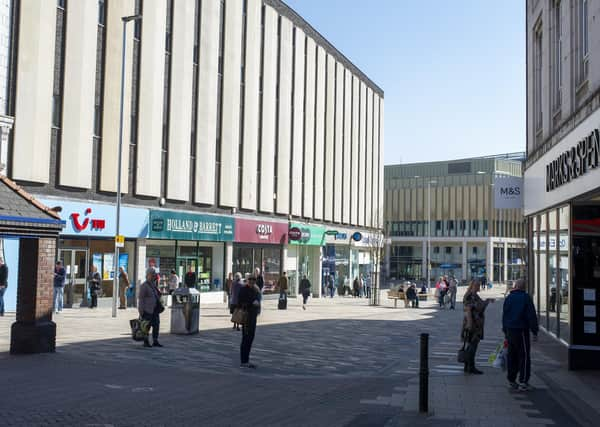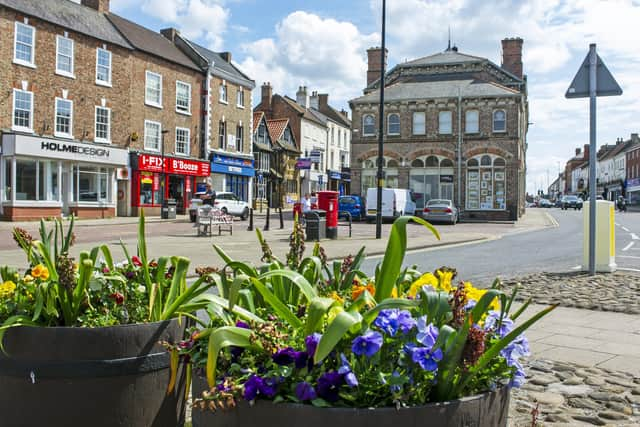Why ‘shop local’ could be priceless to our high streets – Jayne Dowle


My teenage daughter is champing at the bit. She hasn’t been clothes shopping since the middle of March, when we made a mercy dash into town before the shutters came down indefinitely.
And how sad our wardrobes are looking now; leggings washed and worn for weeks, sagging at the knees and pock-marked with holes, last year’s summer dresses dragged out once again with no great enthusiasm.
Advertisement
Hide AdAdvertisement
Hide AdThere’s been the odd internet purchase of course, but I’ve tried to keep the delivery of goods into the house as controlled as possible. Not just for health and hygiene reasons, but the creeping feeling of guilt that buying new threads in the middle of lockdown would have been an indulgence too far.


I even got the sewing machine out but, frankly, haven’t found the time to use it. What with growing all my plants from seed this year and dusting off the cookbooks to find inspiration for family meals, I’ve been busy learning new ideas about self-sufficiency.
Also, Julie Andrews could get away with fashioning frocks from curtains in The Sound of Music, but I’m not quite as skilled at making do with scraps of stuff from the ragbag. Call me old-fashioned, but I like to feel my fabric before I buy.
Our hasty walking route into the town centre takes us past the haberdashery shop. I gaze at the window like a child in front of a toyshop – remember those? – at Christmas, imagining the rolls of materials and ribbons inside.
Advertisement
Hide AdAdvertisement
Hide AdI’ve been into town on just five occasions since the lockdown began, four times to buy an essential item from the chemist and once to see if the fishmonger was open. He was, serving from the back of a van.


What strikes me most, however, is the silence; our voices bounce off the buildings and echo back. In five decades of shopping in Barnsley, I’ve never experienced anything as eerie. Even the pigeons look perturbed.
It’s up to us to put the life back, to throng the streets and the markets with life and chatter once more. We may need to keep two metres apart, for now, but this doesn’t mean we should keep out. Our town centres need us more than ever.
Whilst the pain and separation of strict lockdown may be beginning to ease for some, for others the future looks uncertain. Millions of businesses across the UK have been forced to halt trading.
Advertisement
Hide AdAdvertisement
Hide AdI also know many independent retailers who are desperate to get back to serving their customers face-to-face. The savvy ones have continued trading through lockdown, building on their internet orders and focusing on personal service.
Being restricted has made us reassess what we want to buy and how we want to buy it. Having to wait has been the death knell of instant gratification; and interestingly, less choice can often bring more satisfaction.
Although the topic of ‘what we would buy if we could go to Meadowhall right now’ has kept them going on dull evenings, I’ve told my two teenagers that they must become their own little agents of local growth.
Part of my intention to keep it local is reticence on my part. After following strict social distancing rules for months, the last thing I want is to throw myself into a crowd of people in a confined shopping mall.
Advertisement
Hide AdAdvertisement
Hide AdI wasn’t fond of large-scale shopping at the best of times, and certainly not now. As with all aspects of lockdown-easing, I’m progressing with cautious optimism. And although I’m far from an over-protective mother, I’d prefer it if my teenagers stayed closer to home, for now at least. It’s important also to honour the independent shops and businesses which have proved themselves the lifeblood of our communities.
Ideas for economic regeneration which perhaps once sounded outlandish, such as the ‘slow food’ movement, have found themselves new purpose in lockdown; people have turned to home-cooking, found greengrocers and butchers which deliver, and picked up take-away orders directly from farm shops and local producers.
This is all contributing to what’s known as a ‘circular economy’, an economic system predicated on the continual use of resources and the elimination of waste.
Suddenly, it seems a whole lot more sensible than the ‘take, make and break’ model of consumerism we all once took for granted. In two weeks’ time, when the shutters go up, we must keep it in mind.
Advertisement
Hide AdAdvertisement
Hide AdEditor’s note: first and foremost - and rarely have I written down these words with more sincerity - I hope this finds you well.
Almost certainly you are here because you value the quality and the integrity of the journalism produced by The Yorkshire Post’s journalists - almost all of which live alongside you in Yorkshire, spending the wages they earn with Yorkshire businesses - who last year took this title to the industry watchdog’s Most Trusted Newspaper in Britain accolade.
And that is why I must make an urgent request of you: as advertising revenue declines, your support becomes evermore crucial to the maintenance of the journalistic standards expected of The Yorkshire Post. If you can, safely, please buy a paper or take up a subscription. We want to continue to make you proud of Yorkshire’s National Newspaper but we are going to need your help.
Postal subscription copies can be ordered by calling 0330 4030066 or by emailing [email protected]. Vouchers, to be exchanged at retail sales outlets - our newsagents need you, too - can be subscribed to by contacting subscriptions on 0330 1235950 or by visiting www.localsubsplus.co.uk where you should select The Yorkshire Post from the list of titles available.
Advertisement
Hide AdAdvertisement
Hide AdIf you want to help right now, download our tablet app from the App / Play Stores. Every contribution you make helps to provide this county with the best regional journalism in the country.
Sincerely. Thank you.
James Mitchinson
Comment Guidelines
National World encourages reader discussion on our stories. User feedback, insights and back-and-forth exchanges add a rich layer of context to reporting. Please review our Community Guidelines before commenting.